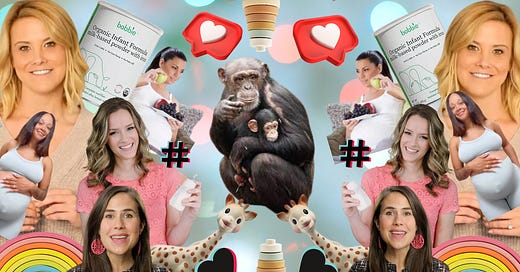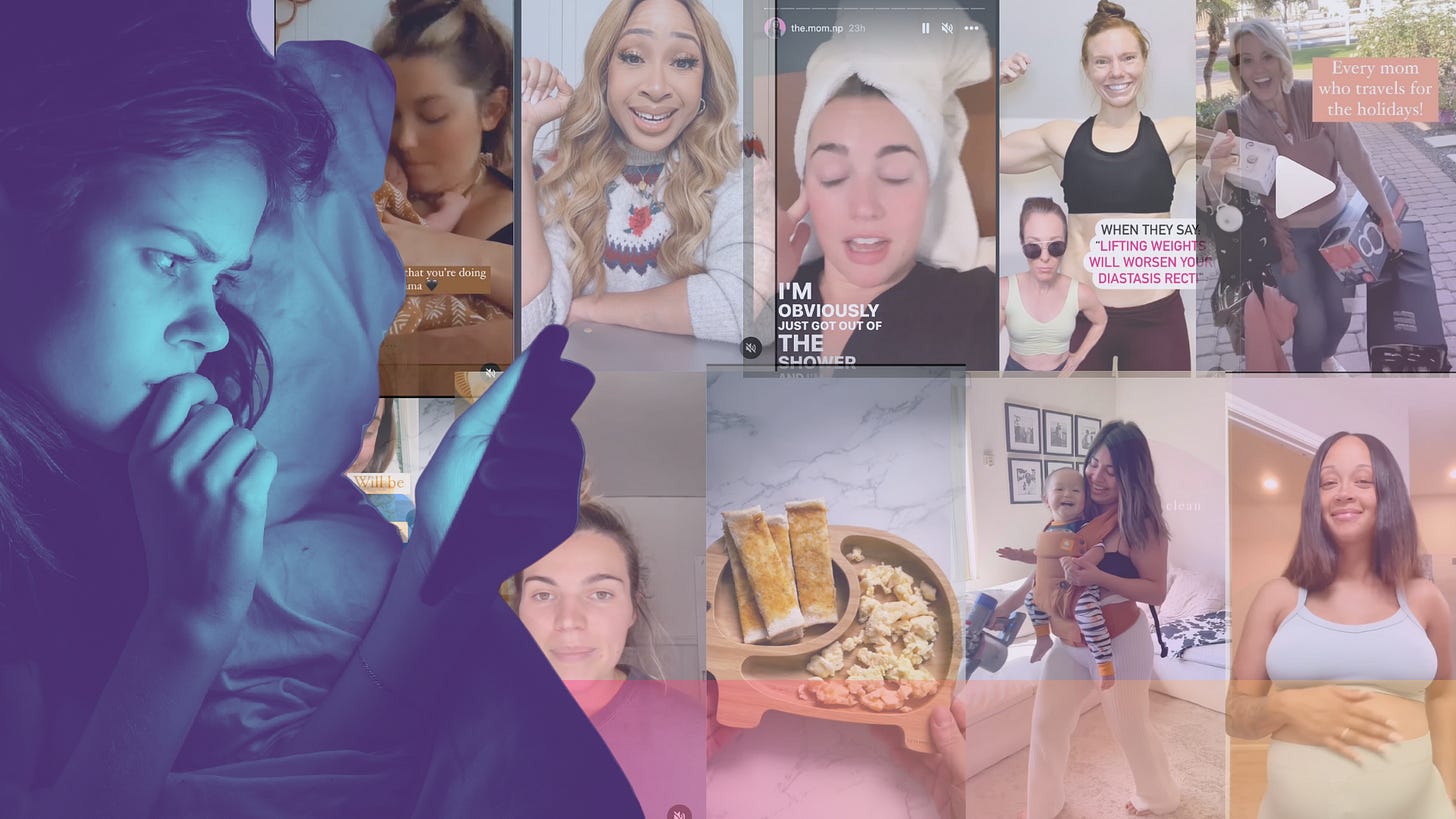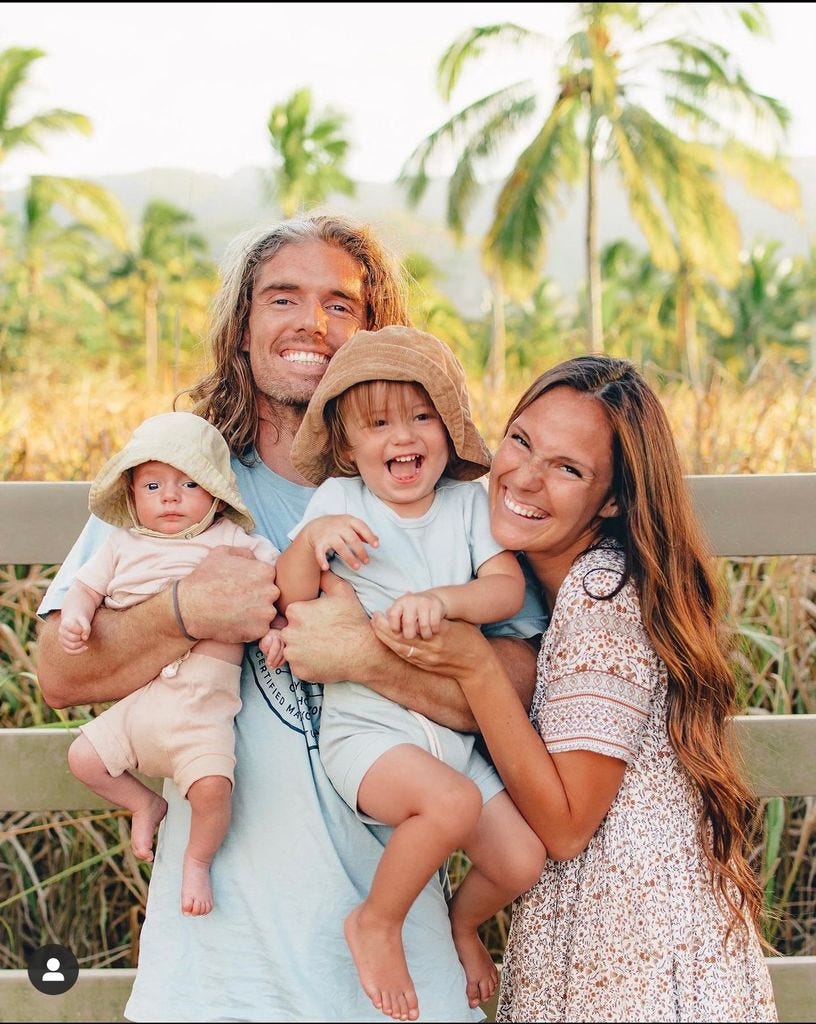A Working Theory on Why Mommy Influencers Have So Much Influence
Our monkey brains know: to keep our baby alive we NEED the support, advice, connection with other women. Even if they live in our stupid little phones.
I’ll confess: there are certain mothers on Instagram who have an astonishing level of influence over me. Recently, my 10-month old infant was diagnosed with an ear infection. The urgent care doctor prescribed us baby Tylenol and Amoxicillin (but apparently there isn’t any left? Great job, Richest Country on Earth!). The second the doctor left the room, I started frantically looking through a feed of a particular Instagram mom I follow because I remember her posting something about how Tylenol is no good for small babies. My husband looked at me incredulously while I scrolled trying to remember her online handle. Was it Wildflower Mom? Wild Woman Mama?
We filled the prescription but never used it. Instead we opted for garlic oil drops (thanks, Andrea!).
If you told me during my early pregnancy that I would consult a non-healthcare professional’s social media feed before following doctor’s orders I would wonder at what point Future Me opted for a lobotomy and YET! Here we are. For better or worse, the word of other mothers has almost equal weight to experts when it comes to keeping my baby healthy right now. Like scores of other women, I used to believe that doctors were, for the most part, always right and that western medicine, though imperfect, was one of the most refined amalgamation of human knowledge.
Now, I’m skeptical of so many interventions and need at least three other mothers I trust to sign off on something before I administer it to my kid. The switch feels strange and disorienting but it turns out, the more I research about human evolution and the way our brains reform during motherhood I think I have a working theory as to why influencers have such immense pull on new moms. Here are my findings!
Influencers as Digital Alloparents
Most American mothers raise their babies in relative insolation. Instead of being surrounded by an extended family full of female relatives and their offspring, we mostly have to rely solely on a male human with useless nipples. If we’re lucky there’s a grandma or sisters nearby who is willing to do some babysitting shifts.
This is an abnormal state of affairs.
In foraging/subsistence cultures--the closest approximation we have to the conditions under which mothers and babies evolved--human babies rely on a wide array of relatives and adults to protect, play, transport and even feed them. Say it with me, folks: it takes a village! This process is known as alloparenting. It's a universal human behavior and it’s proven to be a successful survival strategy. As historian Stephanie Coontz puts it, human children “do best in societies where childrearing is considered too important to be left entirely to parents.” While husbands, uncles, and grandpas can get involved, human/primate moms typically rely on other females to alloparent.
This stockpiling of female alloparents has proven to be one of the best ways to keep your baby alive. As Abigail Tucker put in her FABULOUS book Mom Genes, the desire for female friendship and support for early mothers likely comes from ‘eons of selective pressure’ due to:
“[The] all-hands-on-deck necessity given the length and depth of the human child-reading endeavors, our large numbers of simultaneously young, the dangers of our environments, and the general flakiness of resident males.”
In subsistence societies, the babies of more social mothers are more likely to survive for a variety of reasons, a key one being: co-nursing.
Also, consider rhesus monkeys, our equally socially nuanced primate cousin. Rhesus monkey moms who grow up without a mother are more likely to abuse their infants. Whereas rhesus monkeys who live in close proximity to their own mothers and other female relatives are more competent, confident, and relaxed.
Our monkey brains know: to keep our baby alive we NEED the support, advice, connection with other women. Even if they live in our stupid little phones.
Humans Need to Give their ‘Social Trust’ to Other Humans
Social trust is the concept that we, as humans, form what we believe in based on trusting other people and institutions to tell us what’s true. To put it another way, most of what we believe to be true we do not have first hand knowledge of. We have not gone out and tested first hand ourselves . Like, I BELIEVE we landed on the moon because I ‘trust’ NASA, history books, etc. I haven’t been to the moon to verify moonboot prints and American flag authenticity.
This comes back to humans being social learners— learning from peers and elders how to crack nuts on the Cenozoic plains and keep ourselves alive. It’s a useful skill especially in current day circumstances where we we’re blasted with a firehose to face of factoids, headlines, takes, tweets, toks, and weird dance trends. Putting your trust in a few select humans makes navigating this whole dark carnival existence easier!
This also means new moms who are, again, resource starved, full of fear, doubt and cascading hormones will seize upon another human to tell what the fuck is true. You can see how this can get uplifting (SHOUTOUT BREASTFEEDING COMMUNITY) or extremely bleak (adrenochrome).
I don’t know if garlic drops work on infected baby ears. I know that Andrea is a fellow mother who has my same values, concerns, objectives and worries. I’m feel a more profound sense of social trust in her advice than I did in the the rushed urgent care doctor who glanced at my baby’s ear for a nano-second.
We Are Stressed Captive Gorillas with Smart Phones
An equally fascinating and sad fact: when a female ape gives birth in captivity without other mother apes around she doesn't know how to breastfeed her baby.
From a Lancet study:
“[Gorilla] mothers showed no awareness of the need to feed their infant, having been deprived of the normal experience of observing relatives feeding and caring for their offspring.”
Ok, so, back to the bipedal apes known as us: we mother in isolation, we have to learn how to nourish our baby, and we are hardwired to grasp at anything that’s going to help us keep ourselves and our baby alive. Enter the cozy cream and tangerine filtered world of Mommy Influencers. Not only are our brains soothed by the dopamine scroll through a curated photo grid but seeing another woman, keeping her babies alive, with bedtime routine tips, and smoothie hacks. Hello, monkey sister!
Mommy Influencers can then become a tool to a resource starved mom who is trying to figure out how to safely co-sleep or toggle breastfeeding problems. Of course, the influencer can also be the primary reason a new mom is wasting money on nursery gadgets, trying out new sleep training fads, or making homemade baby formula.
Women who are alienated from their female relatives and especially their moms are even more starved for resources. Under this scenario the Influencer can take such a firm grip over a new mom's frazzled psyche that they can override a mother’s natural response to her baby’s cries for food or comfort. A call to action perfected by 300,000 years of evolution, wiped out by one $120 bundle from Taking Cara Babies.
Obviously, the conditions created by the larger culture--one that values independence and maximum labor market participation over infant’s biological needs--has allowed noxious sleep coaches to infest social media like a bacteria bloom. These coaches and consultants have conspired to make mothers think it’s “good” for their babies to sleep through the night and that sleep is a skill to “learn” both points are bullshit and have no grounding in science, data, anthropology, and so on.
At their best, Mommy Influencers can be a helpful tool as modern women figure out how to mother in isolation at worst, they can exploit the resource-starved mother by encouraging her to spend money useless (affiliate linked) gadgets and drive a wedge between the mother baby dyad in the name of making a profit.
I have found great community and friendship amongst other Online Moms but I am always suspicious of any coach, consultant, influencer who encourages vulnerable women to go against what’s biological normal for their babies… Or recommends Tylenol.







